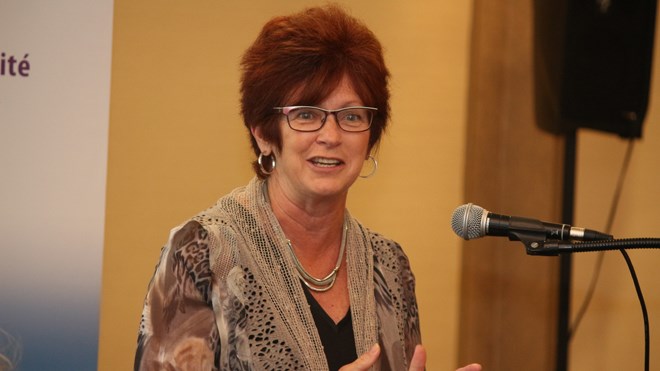After seven years at the helm, Louise Paquette says she's leaving her post as head of the North East Local Health Integration Network at just the right time.
"It's been exciting, it's been overwhelming at times,” Paquette said in her office on the second floor of the Rainbow Centre on Wednesday. “It's time to step back, take a break, contemplate life and spend time with my grandchildren, ride my horse a little more."
“It's time to move on. I think the organization is in good stead right now. It has an excellent senior team, so the timing is good."
The organization, which receives funds from the province and distributes them to 125 health organizations in the northeast, faces challenges because of the geography of northeastern Ontario, she said. With 565,000 people, 60 per cent of whom live in four major cities, that means 40 per cent are dispersed across a lightly populated landscape. That means focusing on care outside of hospitals is key.
"Health care is bigger than hospital care – it means home and community care, it means housing, it means meals, it means access to primary care,” Paquette said. “So looking at all of that, that's why we took the LHIN and divided it basically into hub areas, chunked it up so we could put a lens on the local challenges and the local opportunities."
One of her biggest jobs was ensuring they had a strong voice at the provincial government, something she spent a significant amount of time on.
"That has been, very much, a critical part of my job, making sure that the northern issues are understood ... ensuring that we can argue for funding for specific programs using evidence and outcomes to present that provincially."
One of her proudest accomplishments was cutting wait times for hip and knee surgeries in half. At one time, we were the worst in Ontario.
She's also proud of the harm reduction program on Larch Street, which they developed with the Canadian Mental Health Association. City councillors heard this week about the dramatic results the so-called wet shelter has achieved in helping the most hardcore homeless and addicted residents.
While council approved transferring the building to the CMHA so it can become a full-fledged, 15-person facility, Paquette wonders why the process took two years.
"I must admit that the harm reduction program here in Sudbury took far too long,” she said. “Through no fault of the CHMA or the LHIN. I think the municipality was just not on their game. That would be one I found very disappointing. It was way too slow and not proactive."
While both the NDP and Conservatives have vowed to get rid of the LHINs if elected, calling them too top heavy, Paquette said they ensure community voices and priorities are included in health.
"The fact that it is local is absolutely critical,” she said. "You need to have the conversations locally. The LHINS in Ontario are definitely in touch with their local communities and working across the continuum.
"So if I need hospital care, it's there. If I need home care, it's there. Where we need to do more work ... is in primary care."
She also took a different view of accusations the province is underfunding hospitals. What's needed, she said, is more integration between hospital and community care, so patients that don't need to be in hospital can be moved home with all the support they need.
"It's not a matter of funding for hospitals,” Paquette said. “It's funding for the system, so it can respond to the needs of, in this case, of northerners. If hospitals are successful in becoming those acute (care) sites they need to be ... they need a strong home community sector.
"Otherwise you get gridlock in your hospital. So I think that's what we're trying to figure out in Ontario. Where is that balance?"
Also coming is a plan to have all 24 hospitals share patient information, so if you're admitted to one site and transferred, the next hospital has all your updated records.
"We're one of the first LHINs in Ontario to move that forward," Paquette said. "Much work still to be done, but this is a platform of technology that will make access for Northerners so much easier. So if you have a heart attack in Kapuskasing, and you're medivac'd to HSN, your record is all there."
Overall, she looks back on her time at the LHIN with satisfaction and thinks more of the successes than the struggles.
"We're very proud of what we've done. We worked very hard to be where we are today."
